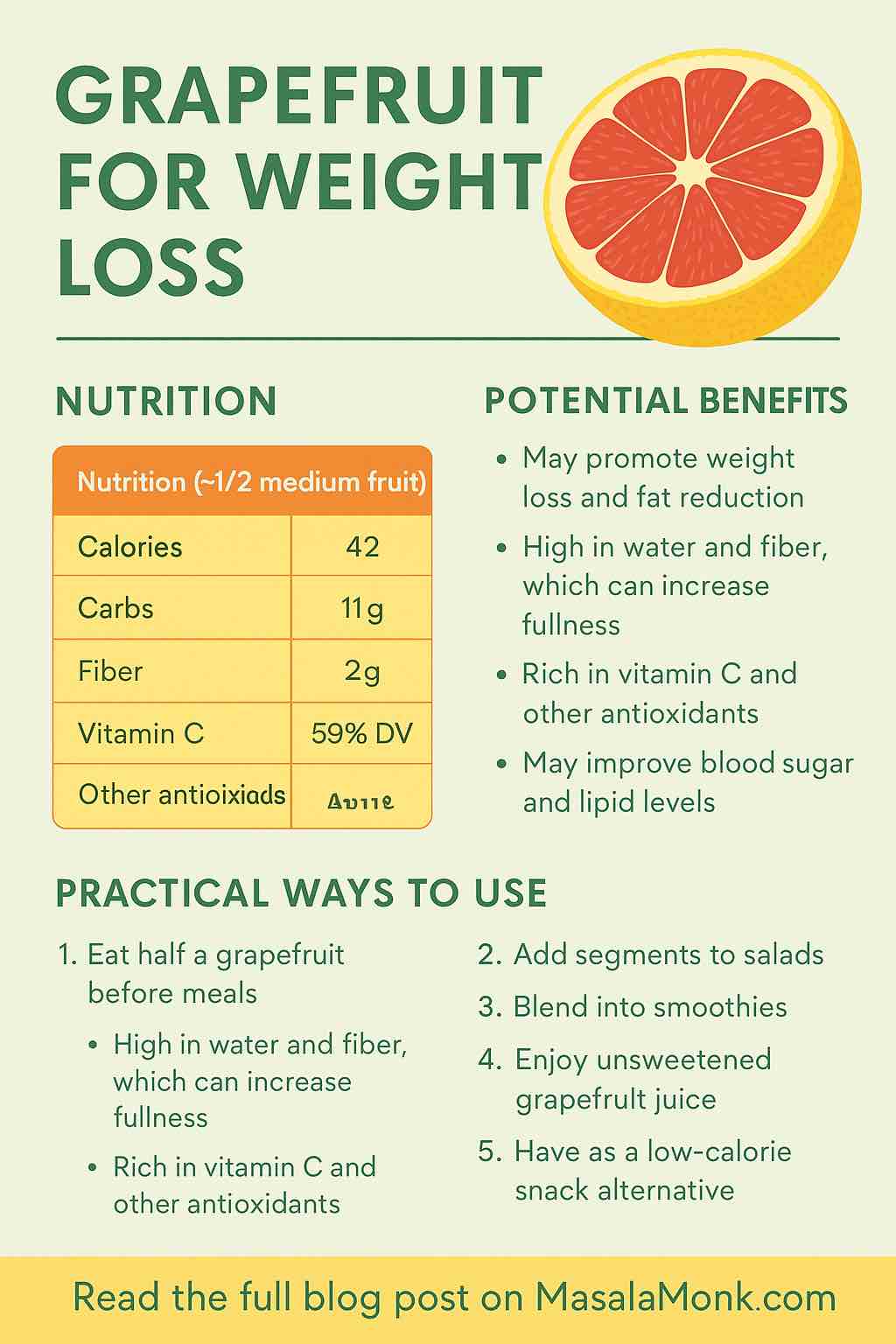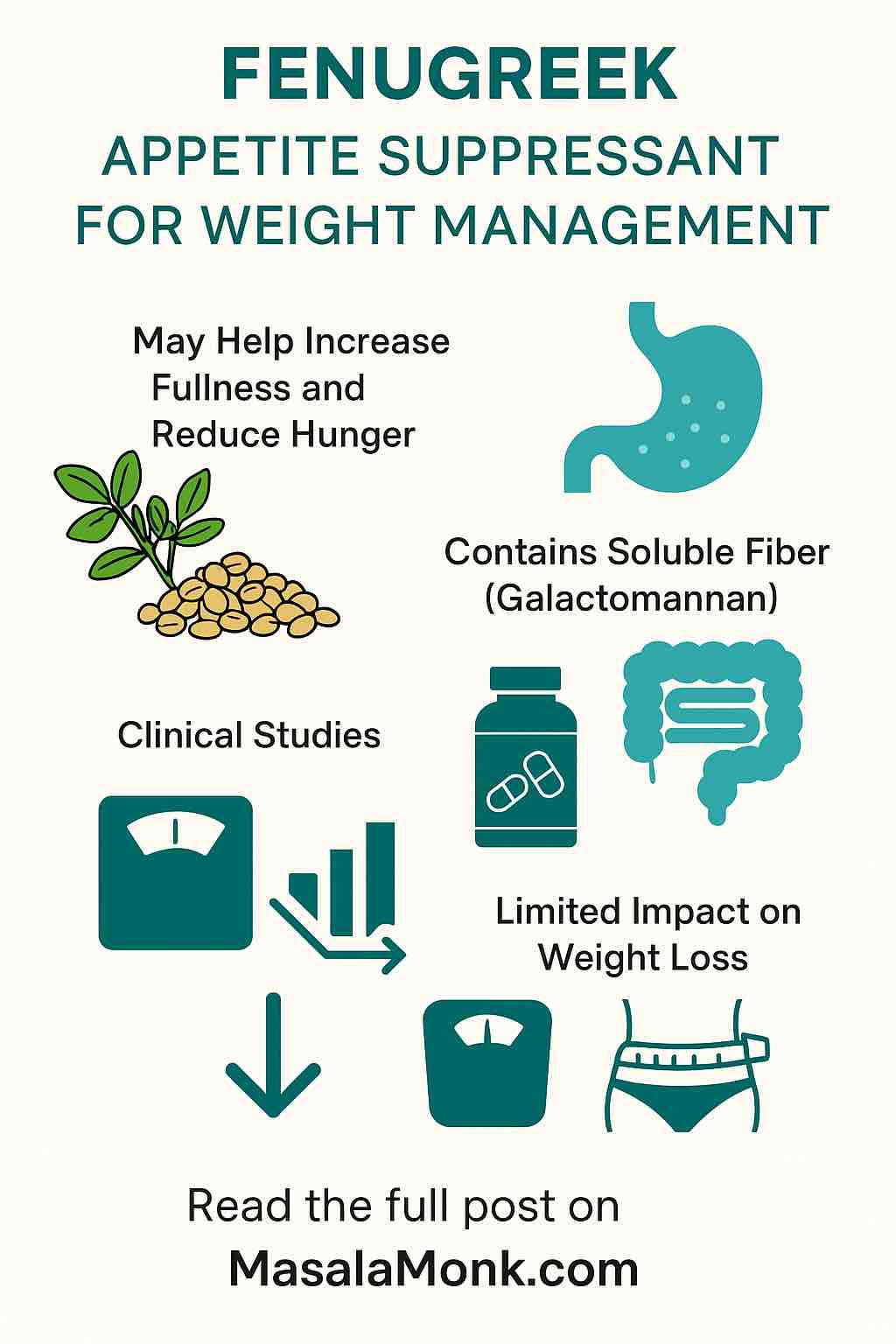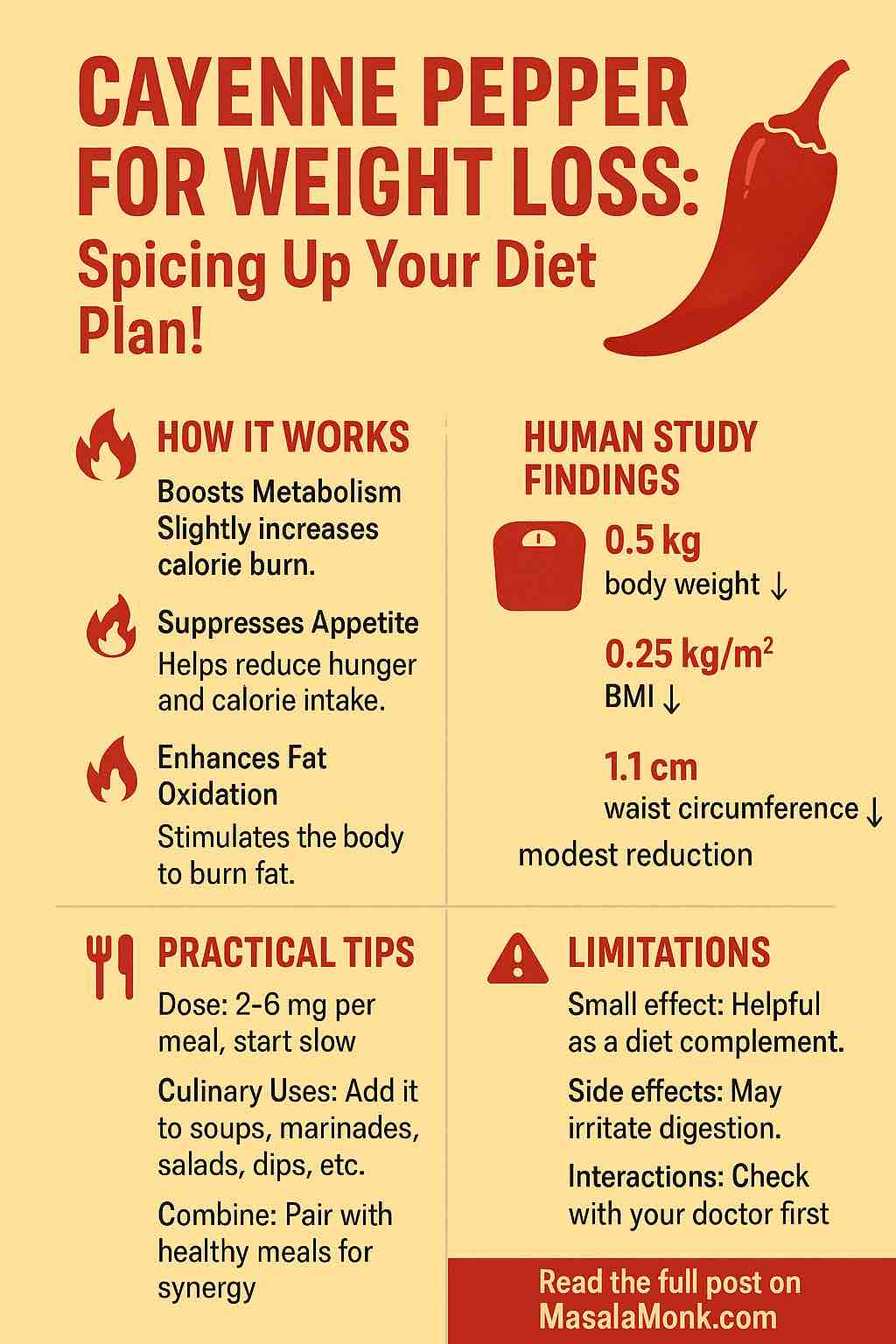
If you’ve ever browsed health blogs or scrolled fitness forums, you’ve seen grapefruit at the center of weight-loss conversations. Is it just hype, or is there real science behind this tangy citrus fruit’s reputation for helping people slim down? The answer is nuanced: grapefruit does offer real benefits for weight management, but understanding how, why, and when to use it is essential—especially as research continues to evolve.
Whether you’re hoping to drop a few pounds or simply optimize your health, this guide will take you deeper into grapefruit’s nutritional profile, proven (and unproven) benefits, and five smart, practical ways to add it to your routine for sustainable results.
The Nutritional Power of Grapefruit
First, let’s start with what you’re eating. A typical half grapefruit (about 120g) contains:
- Calories: ~50 kcal
- Carbs: 13g (including ~8g sugars)
- Fiber: 2g (mainly soluble, great for satiety)
- Protein: 1g
- Fat: 0g
- Vitamin C: Over 60% of daily needs
- Potassium, Vitamin A, Folate, Magnesium, Antioxidants: All present in meaningful amounts
Key Takeaway: Grapefruit is nutrient-dense but low in calories—making it a “high-return” food for those aiming to lose or manage weight.
What the Latest Science Says About Grapefruit and Weight Loss
1. Clinical Trials on Whole Grapefruit
A landmark 12-week clinical trial found that people who ate half a grapefruit before meals lost, on average, 1.6 kg (about 3.5 lbs), compared to just 0.3 kg in the control group. Grapefruit juice and capsules had benefits too, but fresh grapefruit performed best. Importantly, participants also showed improved insulin levels after meals, which may help regulate fat storage.
Why does this work?
- The high fiber and water content help fill you up, so you eat less at meals.
- Grapefruit may reduce insulin spikes after eating, subtly shifting your body toward burning rather than storing fat.
2. Cutting-Edge Supplements: Sinetrol® Xpur and Naringenin
Newer research focuses on grapefruit-derived flavonoids—particularly in supplements like Sinetrol® Xpur and the compound naringenin.
- Sinetrol® Xpur (2024 trial): Over 16 weeks, participants saw reductions in body weight, BMI, and visceral fat, with improvements in “good” HDL cholesterol and insulin sensitivity. The supplement also appeared to boost healthy gut bacteria linked to fat loss.
- Naringenin: This natural flavonoid from grapefruit is being studied for its ability to regulate appetite, improve fat metabolism, and even reduce liver fat in people with fatty liver disease.
But caution: Supplements may have stronger effects—but also greater risk of medication interactions. (More on this below.)
3. Meta-Analysis: What’s the Real-World Impact?
- Fat loss: 5–10% reduction in body fat has been observed in multiple studies over 12–16 weeks, especially when grapefruit or its extracts are paired with calorie control and exercise.
- No “magic” results: Grapefruit helps, but it won’t melt fat by itself. It’s a tool—best used with an overall healthy lifestyle.
5 Practical, Science-Backed Ways to Use Grapefruit for Weight Management
1. Eat Half a Grapefruit Before Meals
Clinical trials show that eating half a fresh grapefruit about 10–15 minutes before meals can naturally reduce appetite and lower the number of calories you eat at that meal. This “preloading” method works best with whole fruit, not juice.
2. Toss Segments Into Salads
Add grapefruit sections to green salads—combine with spinach, avocado, grilled chicken, or nuts. It boosts flavor, adds hydration, and turns a plain salad into a satisfying meal.
3. Blend It Into Smoothies
Grapefruit pairs well with berries, leafy greens, and Greek yogurt. Its tartness balances sweet fruits, while the fiber and water content help you feel full for hours.
4. Swap Sugary Snacks for Grapefruit
Craving a snack? Reach for half a grapefruit instead of cookies or chips. It satisfies a sweet tooth but only delivers about 50 calories and tons of nutrients.
5. Experiment With Supplements—But Be Cautious
If you’re curious about next-level results, look into Sinetrol® Xpur or pure naringenin supplements—but only after talking with your doctor. These are showing real promise for metabolic health and fat loss, but they can interact with many medications (especially cholesterol drugs, blood pressure meds, and immunosuppressants).
Grapefruit and Medications: A Critical Warning
Grapefruit (and its juice) contains natural compounds that block the CYP3A4 enzyme in your intestines. This can dramatically increase the absorption of certain medications—raising their levels in your blood to dangerous heights.
Common drugs that may interact include:
- Statins (for cholesterol)
- Calcium channel blockers (for blood pressure)
- Immunosuppressants
- Benzodiazepines (for anxiety/sleep)
If you take prescription meds, always ask your doctor or pharmacist before adding grapefruit or its supplements to your diet.
Beyond the Hype: The Bottom Line
Grapefruit isn’t a miracle cure, but it is a proven tool in a healthy weight management plan. Here’s why:
- It’s low-calorie and filling.
- Clinical studies confirm it can help you eat less and lose weight, especially before meals.
- Supplements based on grapefruit’s natural compounds are showing promise for fat loss and metabolic health—but with more risk, and still under research.
Best Practices:
- Use grapefruit as a “volume food” to crowd out higher-calorie choices.
- Try to make it part of balanced meals or snacks.
- Monitor your body’s response, and always prioritize medication safety.
Final Thoughts
Grapefruit can be a refreshing, practical tool for weight loss—grounded in real science. Pair it with healthy eating habits, exercise, and smart supplementation (if needed) to see the best results.
If you’re ready to make grapefruit part of your journey, try one of the five methods above this week—and let us know how it goes!
Disclaimer:
Always consult with a healthcare provider before making significant dietary changes or starting new supplements, especially if you take medication.
10 FAQs About Grapefruit and Weight Loss
1. Is grapefruit really effective for weight loss?
Answer:
Yes, but the effect is modest. Clinical studies show that eating half a grapefruit before meals can lead to a weight loss of 1–4 kg (2–9 lbs) over 12–16 weeks, mainly by helping you feel full and reducing calorie intake.
2. Can I use grapefruit juice instead of whole fruit?
Answer:
Whole grapefruit is more effective because it contains more fiber and fewer calories per serving. Unsweetened juice may help, but it spikes blood sugar more quickly and isn’t as filling.
3. Are there any health risks or side effects of eating grapefruit daily?
Answer:
Grapefruit is generally safe for healthy individuals. The main risk is for those on medications that interact with grapefruit, as it can increase drug levels in your blood and cause serious side effects. Always consult your doctor if you’re on medication.
4. How does grapefruit help with weight loss?
Answer:
Grapefruit is high in water and fiber, which help fill you up and curb appetite. It may also slightly reduce insulin spikes after meals, encouraging your body to burn fat rather than store it.
5. Are grapefruit supplements (like Sinetrol® or naringenin) more effective than eating the fruit?
Answer:
Early research suggests supplements may provide additional metabolic benefits, like reducing belly fat or improving cholesterol. However, they come with a greater risk of drug interactions and side effects, so always consult a healthcare provider first.
6. Who should not eat grapefruit?
Answer:
People taking certain medications—including many statins, blood pressure drugs, and immunosuppressants—should avoid grapefruit. Grapefruit can dangerously boost the levels of these drugs in your bloodstream.
7. What is the best time to eat grapefruit for weight loss?
Answer:
Eating half a grapefruit about 10–15 minutes before main meals (especially lunch or dinner) is most effective for reducing appetite and total calorie intake.
8. How long does it take to see results from eating grapefruit?
Answer:
Most studies show noticeable results in 12–16 weeks, with gradual weight loss and improved metabolic markers if combined with a healthy diet and regular exercise.
9. Can grapefruit help reduce belly fat specifically?
Answer:
Some studies and supplements (like Sinetrol® Xpur) have shown reductions in visceral fat (the “belly fat” around your organs), though effects are modest and work best when paired with overall lifestyle changes.
10. Is grapefruit safe for people with diabetes or prediabetes?
Answer:
Grapefruit has a low glycemic index and may help regulate blood sugar, but check with your doctor or dietitian, especially if you are on blood sugar-lowering medications.













